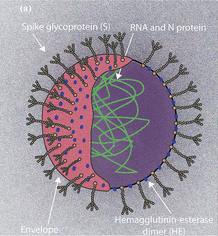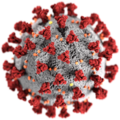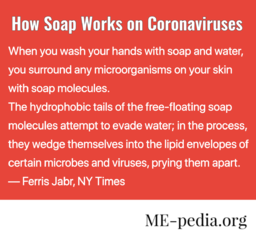Severe acute respiratory syndrome coronavirus 2: Difference between revisions
m (Reverted edits by JaimeS (talk) to last revision by Notjusttired) |
(Added references) |
||
| Line 2: | Line 2: | ||
'''Severe acute respiratory syndrome coronavirus 2''' or '''SARS-CoV-2''', commonly known as the ''novel coronavirus 2019'', is the virus that causes the [[Coronavirus disease 19|COVID-19]] infectious respiratory disease.<ref name="WHO-QA" /> SARS-CoV-2 was previously known as ''n-2019-nCoV''.<ref name="WHO-QA">{{Cite web|url=https://www.who.int/news-room/q-a-detail/q-a-coronaviruses|title=Q&A on coronaviruses (COVID-19)|last=World Health Organization|first=|authorlink=World Health Organization|last2=|first2=|authorlink2=|date=|website=www.who.int|language=en|archive-url=|archive-date=|dead-url=|access-date=2020-03-16}}</ref><ref name="CDC-coronoviruses">{{Cite web|url=https://www.cdc.gov/coronavirus/types.html|title=Human Coronavirus Types|last=Centers for Disease Control and Prevention|first=|authorlink=Centers for Disease Control and Prevention|last2=|first2=|authorlink2=|date=2020-02-27|website=www.cdc.gov|language=en-us|archive-url=|archive-date=|dead-url=|access-date=2020-03-16}}</ref><ref>{{Cite journal|last=Li|first=Guangdi|author-link=|last2=Clercq|first2=Erik De|author-link2=|last3=|first3=|author-link3=|last4=|first4=|author-link4=|last5=|first5=|author-link5=|last6=|first6=|author-link6=|last7=|first7=|last8=|first8=|date=Mar 2020|title=Therapeutic options for the 2019 novel coronavirus (2019-nCoV)|url=https://www.nature.com/articles/d41573-020-00016-0|journal=Nature Reviews Drug Discovery|language=en|volume=19|issue=3|pages=149–150|doi=10.1038/d41573-020-00016-0|pmc=|pmid=|access-date=|quote=|via=}}</ref><ref>{{Cite web|url=https://www.who.int/emergencies/diseases/novel-coronavirus-2019/technical-guidance/naming-the-coronavirus-disease-(covid-2019)-and-the-virus-that-causes-it|title=Naming the coronavirus disease (COVID-19) and the virus that causes it|website=www.who.int|language=en|access-date=2020-03-28}}</ref> | '''Severe acute respiratory syndrome coronavirus 2''' or '''SARS-CoV-2''', commonly known as the ''novel coronavirus 2019'', is the virus that causes the [[Coronavirus disease 19|COVID-19]] infectious respiratory disease.<ref name="WHO-QA" /> SARS-CoV-2 was previously known as ''n-2019-nCoV''.<ref name="WHO-QA">{{Cite web|url=https://www.who.int/news-room/q-a-detail/q-a-coronaviruses|title=Q&A on coronaviruses (COVID-19)|last=World Health Organization|first=|authorlink=World Health Organization|last2=|first2=|authorlink2=|date=|website=www.who.int|language=en|archive-url=|archive-date=|dead-url=|access-date=2020-03-16}}</ref><ref name="CDC-coronoviruses">{{Cite web|url=https://www.cdc.gov/coronavirus/types.html|title=Human Coronavirus Types|last=Centers for Disease Control and Prevention|first=|authorlink=Centers for Disease Control and Prevention|last2=|first2=|authorlink2=|date=2020-02-27|website=www.cdc.gov|language=en-us|archive-url=|archive-date=|dead-url=|access-date=2020-03-16}}</ref><ref>{{Cite journal|last=Li|first=Guangdi|author-link=|last2=Clercq|first2=Erik De|author-link2=|last3=|first3=|author-link3=|last4=|first4=|author-link4=|last5=|first5=|author-link5=|last6=|first6=|author-link6=|last7=|first7=|last8=|first8=|date=Mar 2020|title=Therapeutic options for the 2019 novel coronavirus (2019-nCoV)|url=https://www.nature.com/articles/d41573-020-00016-0|journal=Nature Reviews Drug Discovery|language=en|volume=19|issue=3|pages=149–150|doi=10.1038/d41573-020-00016-0|pmc=|pmid=|access-date=|quote=|via=}}</ref><ref>{{Cite web|url=https://www.who.int/emergencies/diseases/novel-coronavirus-2019/technical-guidance/naming-the-coronavirus-disease-(covid-2019)-and-the-virus-that-causes-it|title=Naming the coronavirus disease (COVID-19) and the virus that causes it|website=www.who.int|language=en|access-date=2020-03-28}}</ref> | ||
SARS-CoV-2 was first identified in Wuhan, China, in December 2019, as a result of investigations into a group of patients with the newly discovered [[Coronavirus disease 19|COVID-19]] pneumonia.<ref name="WHO-QA" /> SARS-CoV-2 can cause COVID-19 in babies, children, and adults of any age.<ref>{{Cite journal|last=Wei|first=Min|last2=Yuan|first2=Jingping|last3=Liu|first3=Yu|last4=Fu|first4=Tao|last5=Yu|first5=Xue|last6=Zhang|first6=Zhi-Jiang|date=2020-02-14|title=Novel Coronavirus Infection in Hospitalized Infants Under 1 Year of Age in China|url=https://jamanetwork.com/journals/jama/fullarticle/2761659|journal=JAMA|language=en|doi=10.1001/jama.2020.2131}}</ref> It spread globally, resulting in the 2019-2020 coronavirus pandemic.<ref>{{Cite journal|last=Hui|first=David S.|last2=Azhar|first2=Esam I.|last3=Madani|first3=Tariq A.|last4=Ntoumi|first4=Francine|last5=Kock|first5=Richard|last6=Dar|first6=Osman|last7=Ippolito|first7=Giuseppe|last8=Mchugh|first8=Timothy D.|last9=Memish|first9=Ziad A.|date=2020-02-01|title=The continuing 2019-nCoV epidemic threat of novel coronaviruses to global health — The latest 2019 novel coronavirus outbreak in Wuhan, China|url=https://www.ijidonline.com/article/S1201-9712(20)30011-4/abstract|journal=International Journal of Infectious Diseases|language=English|volume=91|pages=264–266|doi=10.1016/j.ijid.2020.01.009|issn=1201-9712|pmid=31953166}}</ref><ref>{{Cite web|url=https://www.who.int/dg/speeches/detail/who-director-general-s-opening-remarks-at-the-media-briefing-on-covid-19---11-march-2020|title=WHO Director-General's opening remarks at the media briefing on COVID-19 - 11 March 2020|website=www.who.int|language=en|access-date=2020-03-28}}</ref> | SARS-CoV-2 was first identified in Wuhan, China, in December 2019, as a result of investigations into a group of patients with the newly discovered [[Coronavirus disease 19|COVID-19]] pneumonia.<ref name="WHO-QA" /> SARS-CoV-2 can cause COVID-19 in babies, children, and adults of any age.<ref>{{Cite journal|last=Wei|first=Min|last2=Yuan|first2=Jingping|last3=Liu|first3=Yu|last4=Fu|first4=Tao|last5=Yu|first5=Xue|last6=Zhang|first6=Zhi-Jiang|date=2020-02-14|title=Novel Coronavirus Infection in Hospitalized Infants Under 1 Year of Age in China|url=https://jamanetwork.com/journals/jama/fullarticle/2761659|journal=JAMA|language=en|doi=10.1001/jama.2020.2131}}</ref> It spread globally, resulting in the 2019-2020 coronavirus pandemic.<ref>{{Cite journal|last=Hui|first=David S.|last2=Azhar|first2=Esam I.|last3=Madani|first3=Tariq A.|last4=Ntoumi|first4=Francine|last5=Kock|first5=Richard|last6=Dar|first6=Osman|last7=Ippolito|first7=Giuseppe|last8=Mchugh|first8=Timothy D.|last9=Memish|first9=Ziad A.|date=2020-02-01|title=The continuing 2019-nCoV epidemic threat of novel coronaviruses to global health — The latest 2019 novel coronavirus outbreak in Wuhan, China|url=https://www.ijidonline.com/article/S1201-9712(20)30011-4/abstract|journal=International Journal of Infectious Diseases|language=English|volume=91|pages=264–266|doi=10.1016/j.ijid.2020.01.009|issn=1201-9712|pmid=31953166}}</ref><ref>{{Cite web|url=https://www.who.int/dg/speeches/detail/who-director-general-s-opening-remarks-at-the-media-briefing-on-covid-19---11-march-2020|title=WHO Director-General's opening remarks at the media briefing on COVID-19 - 11 March 2020|website=www.who.int|language=en|access-date=2020-03-28}}</ref>{{See also|Coronavirus disease 19|Coronavirus disease 19 (COVID-19)}}<div role="note" class="hatnote navigation-not-searchable">{{See also|Coronavirus disease 19|Coronavirus disease 19 (COVID-19)}}</div> | ||
{{See also|Coronavirus disease 19|Coronavirus disease 19 (COVID-19)}} | |||
{{ | |||
==COVID-19== | ==COVID-19== | ||
| Line 11: | Line 9: | ||
==How soap and alcohol destroy coronaviruses== | ==How soap and alcohol destroy coronaviruses== | ||
[[File:How soap works coronaviruses.png|thumb|left|alt=How Soap Works on Coronaviruses. "When you wash your hands with soap and water, you surround any microorganisms on your skin with soap molecules. The hydrophobic tails of the free-floating soap molecules attempt to evade water; in the process, they wedge themselves into the lipid envelopes of certain microbes and viruses, prying them apart." - Ferris Jabr, New York Times | [[File:How soap works coronaviruses.png|thumb|left|alt=How Soap Works on Coronaviruses. "When you wash your hands with soap and water, you surround any microorganisms on your skin with soap molecules. The hydrophobic tails of the free-floating soap molecules attempt to evade water; in the process, they wedge themselves into the lipid envelopes of certain microbes and viruses, prying them apart." - Ferris Jabr, New York Times|256x256px]] | ||
Coronaviruses, including the viruses that cause [[Coronavirus disease 19|COVID-19]], [[Severe acute respiratory syndrome|SARS]], [[influenza A virus subtype H1N1|H1N1 flu]] (swine flu), and seasonal [[influenza|flu]], are all protected by an envelope of fat; soap molecules invade the envelope and disrupt its integrity. High concentrations of [[ethyl alcohol]] or [[isopropyl alcohol]] can strip away parts of the envelope, leading to the inaction of of the viral molecules.<ref name="CDC-disinfection">https://www.cdc.gov/infectioncontrol/guidelines/disinfection/disinfection-methods/chemical.html</ref><ref name="SoapNYT">https://www.nytimes.com/2020/03/13/health/soap-coronavirus-handwashing-germs.html</ref> Isopropyl alcohol works against all viruses enveloped in fat, and ethyl alcohol additionally works against some non-enveloped viruses such as rotaviruses, when used at the correct concentrations.<ref name="CDC-disinfection" /> | |||
Coronaviruses, including the viruses that cause [[Coronavirus disease 19|COVID-19]], [[Severe acute respiratory syndrome|SARS]], [[influenza A virus subtype H1N1|H1N1 flu]] (swine flu), and seasonal [[influenza|flu]], are all protected by an envelope of fat; soap molecules invade the envelope and | |||
{{clear}} | {{clear}} | ||
==Comparison with SARS== | ==Comparison with SARS== | ||
The SARS-CoV-2 virus that causes COVID-19 illness is closely related to SARS-CoV: the coronavirus that causes Severe Acute Respiratory Syndrome.<ref name="genome">https://pubmed.ncbi.nlm.nih.gov/31987001/</ref > The genome of the SARS-COV-2 virus was found to have 82% similarity with the virus that causes SARS.<ref name="genome" /> | [[File:COVID-19_coronavirus_drawing.png|thumb|right|'''SARS-CoV-2 coronavirus: artistic drawing of the structure and cross-section.'''<br>Author: | ||
[https://doi.org/10.1128/mSystems.00245-20 Dietz et al (2020), mSystems 5:e00245-20.]]] | |||
The SARS-CoV-2 virus that causes COVID-19 illness is closely related to SARS-CoV: the coronavirus that causes Severe Acute Respiratory Syndrome.<ref name="genome">https://pubmed.ncbi.nlm.nih.gov/31987001/</ref> The genome of the SARS-COV-2 virus was found to have 82% similarity with the virus that causes SARS.<ref name="genome" /> | |||
The SARS-CoV-2 virus appears to be significantly more contagious than the SARS-CoV virus that causes SARS, and spreads significantly in the community, unlike SARS-CoV which spread more in hospitals, | The SARS-CoV-2 virus appears to be significantly more contagious than the SARS-CoV virus that causes SARS, and spreads significantly in the community, unlike SARS-CoV which spread more in hospitals, healthcare settings and nursing homes than in the wider community.<ref name="COVID-19">https://academic.oup.com/jtm/article/27/2/taaa021/5735319</ref><ref name="Wilder2019">https://www.thelancet.com/journals/laninf/article/PIIS1473-3099(20)30129-8/fulltext</ref> | ||
The resulting COVID-19 illness has a lower risk of death than SARS, but has killed a much higher number of people.{{ | The resulting COVID-19 illness has a lower risk of death than SARS, but has killed a much higher number of people.<ref>{{Cite web|url=https://www.cdc.gov/sars/about/faq.html|title=SARS {{!}} Frequently Asked Questions {{!}} CDC|date=2019-02-08|website=www.cdc.gov|language=en-us|access-date=2020-05-10}}</ref><ref>{{Cite web|url=https://coronavirus.jhu.edu/map.html|title=COVID-19 Map|website=Johns Hopkins Coronavirus Resource Center|language=en|access-date=2020-05-10}}</ref> Both COVID-19 and SARS are many times more likely to kill than seasonal flu illnesses.<ref>{{Cite news|url=https://www.livescience.com/new-coronavirus-compare-with-flu.html|title=How does the new coronavirus compare with the flu?|last=Rettner|first=Rachael|date=4/30/20|work=Live Science|access-date=5/10/20|archive-url=|archive-date=|dead-url=|quote=|author-link=}}</ref><ref>{{Cite web|url=https://www.who.int/emergencies/diseases/novel-coronavirus-2019/question-and-answers-hub/q-a-detail/q-a-similarities-and-differences-covid-19-and-influenza|title=Q&A: Similarities and differences – COVID-19 and influenza|last=World Health Organization|first=|authorlink=|last2=|first2=|authorlink2=|date=3/17/20|website=World Health Organization|archive-url=|archive-date=|dead-url=|access-date=5/10/20}}</ref> | ||
==Notable studies== | ==Notable studies== | ||
Revision as of 21:23, May 10, 2020
Severe acute respiratory syndrome coronavirus 2 or SARS-CoV-2, commonly known as the novel coronavirus 2019, is the virus that causes the COVID-19 infectious respiratory disease.[1] SARS-CoV-2 was previously known as n-2019-nCoV.[1][2][3][4]
SARS-CoV-2 was first identified in Wuhan, China, in December 2019, as a result of investigations into a group of patients with the newly discovered COVID-19 pneumonia.[1] SARS-CoV-2 can cause COVID-19 in babies, children, and adults of any age.[5] It spread globally, resulting in the 2019-2020 coronavirus pandemic.[6][7]
COVID-19[edit | edit source]
Some people who become infected with SARS-CoV-2 do not develop COVID-19 illness, but these asymptomatic carriers can transmit it to others.[1] Of those who do develop COVID-19, 1 in 6 people need medical help, and the 2019-2020 pandemic has caused a significant number of deaths.[1][8][9]
[edit | edit source]
Coronaviruses, including the viruses that cause COVID-19, SARS, H1N1 flu (swine flu), and seasonal flu, are all protected by an envelope of fat; soap molecules invade the envelope and disrupt its integrity. High concentrations of ethyl alcohol or isopropyl alcohol can strip away parts of the envelope, leading to the inaction of of the viral molecules.[10][11] Isopropyl alcohol works against all viruses enveloped in fat, and ethyl alcohol additionally works against some non-enveloped viruses such as rotaviruses, when used at the correct concentrations.[10]
Comparison with SARS[edit | edit source]

Author: Dietz et al (2020), mSystems 5:e00245-20.
The SARS-CoV-2 virus that causes COVID-19 illness is closely related to SARS-CoV: the coronavirus that causes Severe Acute Respiratory Syndrome.[12] The genome of the SARS-COV-2 virus was found to have 82% similarity with the virus that causes SARS.[12]
The SARS-CoV-2 virus appears to be significantly more contagious than the SARS-CoV virus that causes SARS, and spreads significantly in the community, unlike SARS-CoV which spread more in hospitals, healthcare settings and nursing homes than in the wider community.[13][14]
The resulting COVID-19 illness has a lower risk of death than SARS, but has killed a much higher number of people.[15][16] Both COVID-19 and SARS are many times more likely to kill than seasonal flu illnesses.[17][18]
Notable studies[edit | edit source]
- 2020, Structural basis of receptor recognition by SARS-CoV-2 - (Full text)
Learn more[edit | edit source]
- Coronavirus (COVID-19) - CDC
- Coronavirus - World Health Organization
- Coronavirus disease (COVID-19) Pandemic - World Health Organization
- Coronavirus (COVID-19) - NHS
See also[edit | edit source]
- Coronavirus disease 19 (COVID-19)
- Severe Acute Respiratory Syndrome (SARS)
References[edit | edit source]
- ↑ 1.0 1.1 1.2 1.3 1.4 World Health Organization. "Q&A on coronaviruses (COVID-19)". www.who.int. Retrieved March 16, 2020. Cite has empty unknown parameter:
|dead-url=(help) - ↑ Centers for Disease Control and Prevention (February 27, 2020). "Human Coronavirus Types". www.cdc.gov. Retrieved March 16, 2020. Cite has empty unknown parameter:
|dead-url=(help) - ↑ Li, Guangdi; Clercq, Erik De (March 2020). "Therapeutic options for the 2019 novel coronavirus (2019-nCoV)". Nature Reviews Drug Discovery. 19 (3): 149–150. doi:10.1038/d41573-020-00016-0.
- ↑ "Naming the coronavirus disease (COVID-19) and the virus that causes it". www.who.int. Retrieved March 28, 2020.
- ↑ Wei, Min; Yuan, Jingping; Liu, Yu; Fu, Tao; Yu, Xue; Zhang, Zhi-Jiang (February 14, 2020). "Novel Coronavirus Infection in Hospitalized Infants Under 1 Year of Age in China". JAMA. doi:10.1001/jama.2020.2131.
- ↑ Hui, David S.; Azhar, Esam I.; Madani, Tariq A.; Ntoumi, Francine; Kock, Richard; Dar, Osman; Ippolito, Giuseppe; Mchugh, Timothy D.; Memish, Ziad A. (February 1, 2020). "The continuing 2019-nCoV epidemic threat of novel coronaviruses to global health — The latest 2019 novel coronavirus outbreak in Wuhan, China". International Journal of Infectious Diseases. 91: 264–266. doi:10.1016/j.ijid.2020.01.009. ISSN 1201-9712. PMID 31953166.
- ↑ "WHO Director-General's opening remarks at the media briefing on COVID-19 - 11 March 2020". www.who.int. Retrieved March 28, 2020.
- ↑ CDC (March 20, 2020). "Coronavirus Disease 2019 (COVID-19) – Symptoms". Centers for Disease Control and Prevention. Retrieved March 24, 2020. Cite has empty unknown parameter:
|1=(help) - ↑ 10.0 10.1 https://www.cdc.gov/infectioncontrol/guidelines/disinfection/disinfection-methods/chemical.html
- ↑ https://www.nytimes.com/2020/03/13/health/soap-coronavirus-handwashing-germs.html
- ↑ 12.0 12.1 https://pubmed.ncbi.nlm.nih.gov/31987001/
- ↑ https://academic.oup.com/jtm/article/27/2/taaa021/5735319
- ↑ https://www.thelancet.com/journals/laninf/article/PIIS1473-3099(20)30129-8/fulltext
- ↑ "SARS | Frequently Asked Questions | CDC". www.cdc.gov. February 8, 2019. Retrieved May 10, 2020.
- ↑ "COVID-19 Map". Johns Hopkins Coronavirus Resource Center. Retrieved May 10, 2020.
- ↑ Rettner, Rachael (4/30/20). "How does the new coronavirus compare with the flu?". Live Science. Retrieved 5/10/20. Cite has empty unknown parameter:
|dead-url=(help); Check date values in:|access-date=and|date=(help) - ↑ World Health Organization (3/17/20). "Q&A: Similarities and differences – COVID-19 and influenza". World Health Organization. Retrieved 5/10/20. Cite has empty unknown parameter:
|dead-url=(help); Check date values in:|access-date=and|date=(help)



